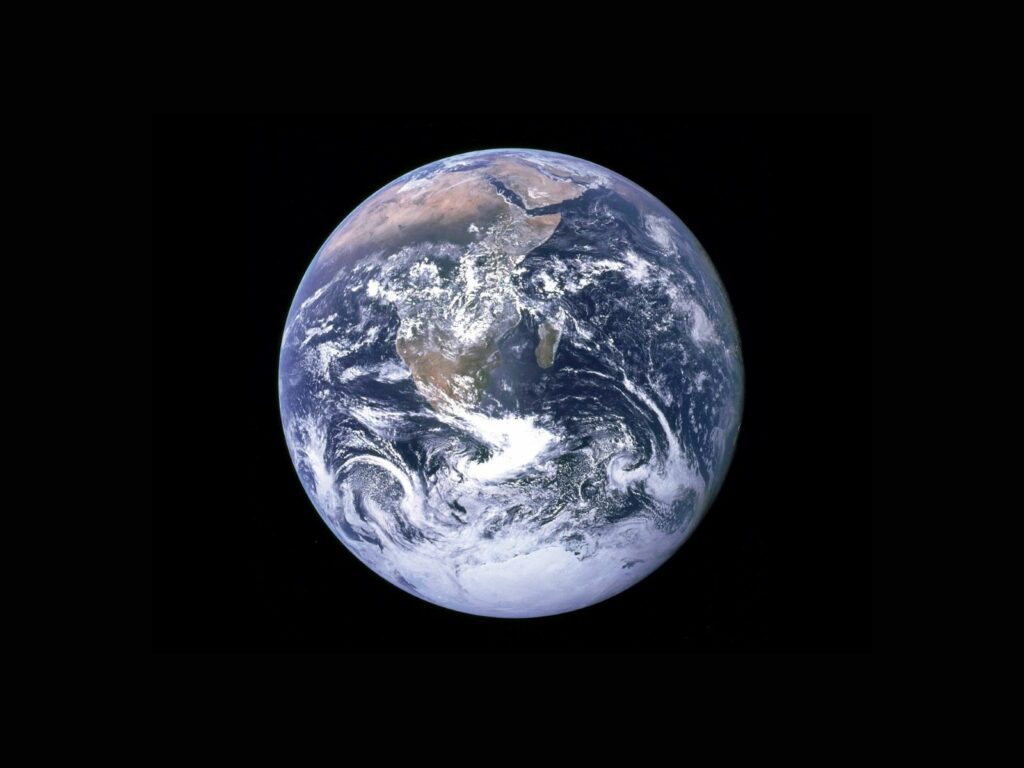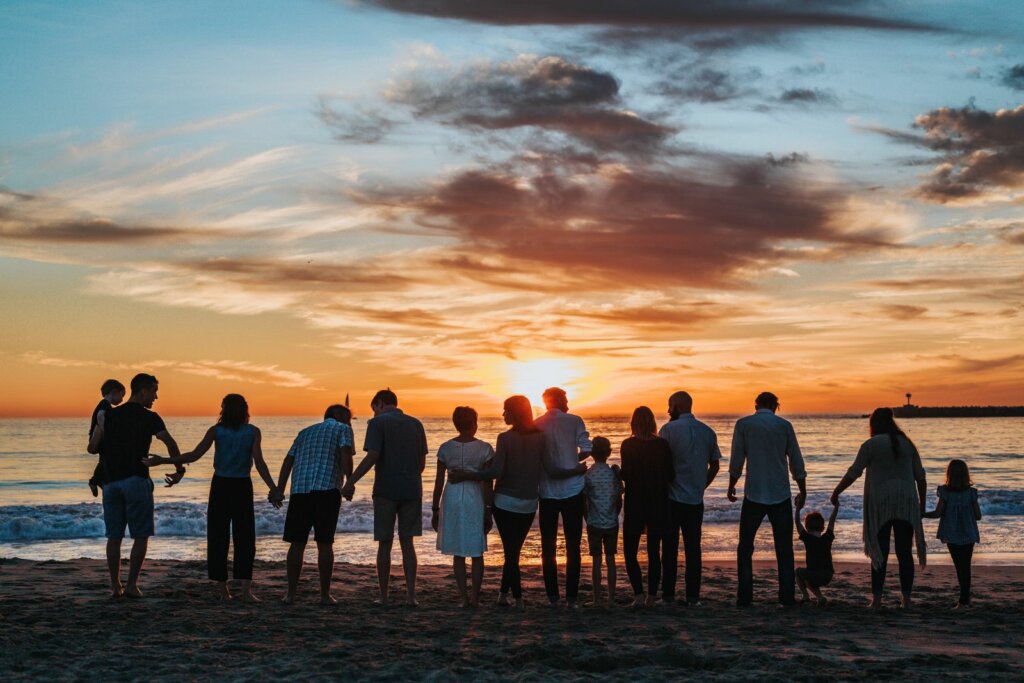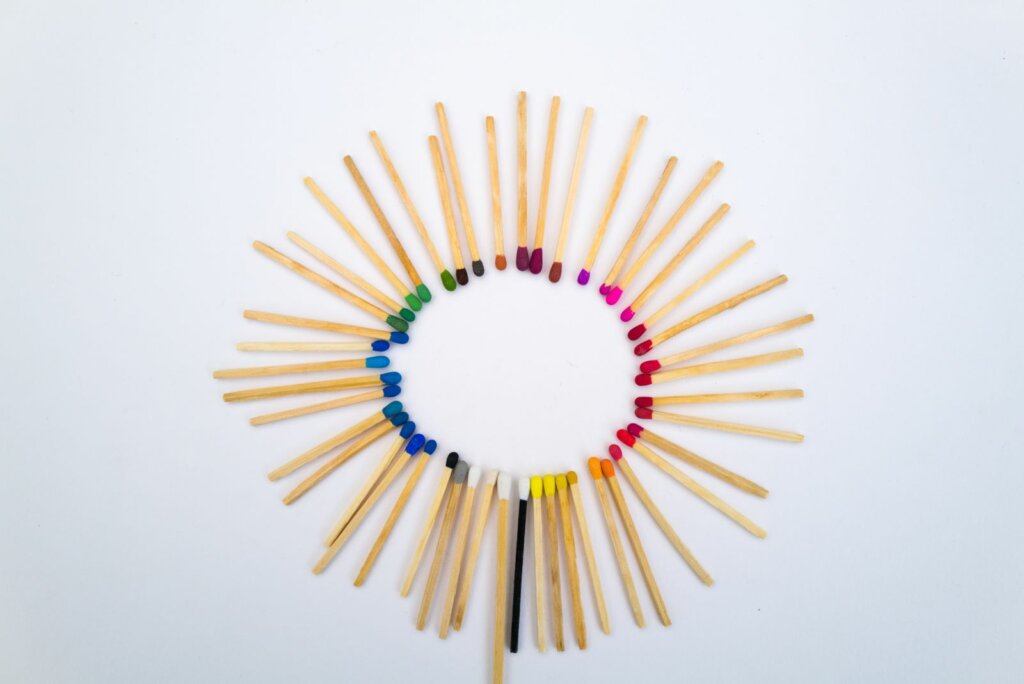One of my core wounds is around belonging. I would say that’s a consequence of growing up as the “weird kid” but these days I think everyone has this wound. We all want to belong. To be clear, belonging is not the same thing as fitting in. As Brené Brown says, “Belonging is being accepted for you. Fitting in is being accepted for being like everyone else.”
For instance, fitting in is wearing the same jeans as everyone else. Belonging is wearing the jeans you want to wear without fear you’ll get kicked out of the group or teased. Belonging means sharing your authentic self and trusting you’ll still be loved and accepted. I don’t know if this is a hallmark of belonging but for me, belonging is not only being accepted by one person, it’s about being accepted by a group. I may be accepted in a one-on-one interaction but what happens when another person is added to the mix? How about when there are three people? Four?
Things get more complicated the more people you add to a group. I don’t know if you’ve noticed but people are messy and flawed. Inevitably we fight with other people, we disagree on key positions, and then suddenly we’re no longer a part of the group. This happens all the time, even among people who are keen on creating belonging. Do you know why most intentional communities fail? Because of challenging interpersonal dynamics, of course!
It may seem like the solution is to find a different group, to continue narrowing your focus on people who are like you but anchoring belonging to other people is like building a house on sand – eventually, it will collapse. You can’t count on people to provide you with perpetual belonging. How do we find belonging then?
I can’t say what works for other people but what works for me relates to my post from early February about how we are nature. It’s recognizing as Earthlings, we always belong to the Earth. There is nowhere we can go on the planet where we’re not connected to the planet. If that’s a little heady, I’ve been imagining growing roots and anchoring to the Earth but also having the Earth flow its energy back to me.
I envision filtered Earth energy in the form of golden light permeating my entire body reminding me, yes, we are connected, yes, it’s constant, and yes, I always belong to the planet. There can be no falling out with Earth. It’s forever holding me, loving me, nurturing me. On good days and bad days, the planet is my constant companion. And not only the planet.
In my spiritual tradition, it’s said the Divine is your one true friend, your one true companion because it’s with you from birth to death and lifetime after lifetime. The Divine never leaves you, ever. And furthermore, the secret of meditation is to realize we’re being meditated upon all the time. We have love constantly raining down on us whether we’re aware of it or not. The secret of meditation is to become aware of it. One of my favorite blogs about the concept is from a decade ago where I write that we are the beloved. And it’s true – whether somatically from the planet or spiritually from the Divine, we are loved beyond measure and we always, always belong.
I dream of a world where we let ourselves be who we really are without fear. A world where we understand we don’t have to change anything about ourselves to belong. A world where instead of turning to people to meet that need for belonging, we turn to something more constant: the planet and the Divine.
Another world is not only possible, it’s probable.
My social media feed is serving up some pretty horrific things lately. There seem to be endless ways that people are cruel to one another and I know many people are worried that the recent U.S. elections will embolden more of that kind of behavior. But people aren’t only cruel, they’re also kind.
What follows are two examples that remind me people do still care about one another. I’m organizing a retreat for my spiritual community and the retreat site doesn’t have strong wifi throughout, which is a problem because our retreat will be a hybrid one. We need to borrow a wifi booster/extender and instead of buying a new one to use for literally five days, I emailed my tech friends. Wouldn’t you know it – one of them has an extender I can borrow.
You might be saying to yourself, “So? That’s such a small thing. And you asked a friend for help. That’s what friends do.” True. But also this weekend a Substack I subscribe to opened up the comments for people to “take one/leave one,” meaning ask for something they need like a beta reader and offer something like critiquing a query letter. There, too, people are supporting one another, not friends – strangers.
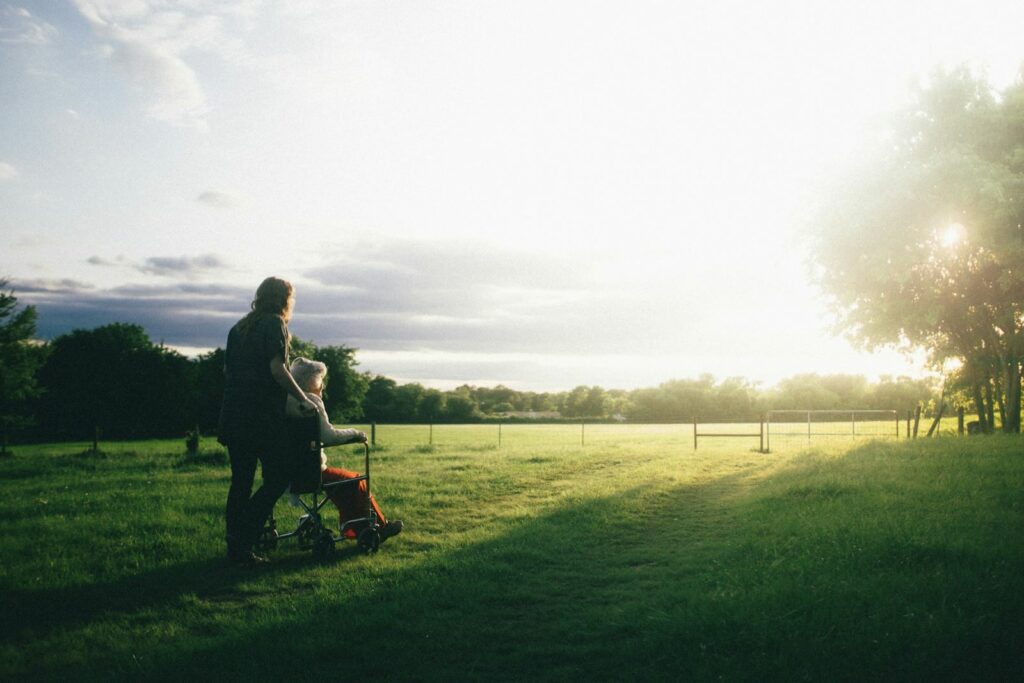
We are still kind to one another. Photo by Dominik Lange on Unsplash
These small things give me hope because this is always how the world works. We lean on one another for support and care. Dr. Clarissa Pinkola Estés wrote:
“Ours is not the task of fixing the entire world all at once, but of stretching out to mend the part of the world that is within our reach. Any small, calm thing that one soul can do to help another soul, to assist some portion of this poor suffering world, will help immensely. It is not given to us to know which acts or by whom, will cause the critical mass to tip toward an enduring good.
“What is needed for dramatic change is an accumulation of acts, adding, adding to, adding more, continuing. We know that it does not take everyone on Earth to bring justice and peace, but only a small, determined group who will not give up during the first, second, or hundredth gale.”
Her sentiment echoes the famous Margaret Mead quote: “Never doubt that a small group of thoughtful, committed citizens can change the world; indeed, it’s the only thing that ever has.” And don’t doubt that you are that citizen. The small things we do every day – lending wifi routers, offering to babysit someone’s children, bringing someone soup – these are the things that remind our brains and bodies that we aren’t alone. That people are still good and kind and helpful. That matters.
In times when it seems like people are hellbent on tearing one another down mentally, emotionally, and physically, these small acts of kindness are huge. They let us know despite the barrage of negativity, we still have each other. And that makes all the difference.
I dream of a world where we continue to show up for one another. A world where we give and receive what we can. A world where we focus on our circles of influence and help those around us. A world where we don’t let negativity drag us down because we remember that we still have each other.
Another world is not only possible, it’s probable.
Growing up, I was the weird kid because I didn’t fit in with my peers. I was a vegetarian in the 90s and my first-grade teacher announced to the class I didn’t eat meat because I was Jewish. (I think you know this but just in case, the two are not related.) I didn’t grow up in a bastion of diversity and understanding and that’s colored, well, a lot.
As an adult, I let my freak flag fly and usually have no problem standing out. I joke that my biography title should be: “Always the Outlier: The Rebekah Moan Story” because it’s true in 99% of cases that I’m the outlier. Over the past few weeks though, I notice parts of me are scared to be vulnerable and authentic. I realize a lot of people feel that way but that’s an unusual feeling for me. Normally, I don’t have a problem saying, “This is me. Here’s how I’m feeling,” but some parts of me feel terrified to do that because I’m worried people will run away screaming if I do.
When I shared that with a friend, she said, “Yeah because I haven’t seen the real you in our eight years of friendship.” I never said it made sense but that’s what wounding does. It makes us irrational. I’ve been ruminating over my experiences and a strong memory emerged from second grade when my music teacher went around the room and asked every child what their favorite music genre was. One by one, every child said, “country,” including me, even though I couldn’t name a country song to save my life. What I meant to say was “oldies” because that’s what my parents played around the house but I didn’t because the pressure to fit in was too great.
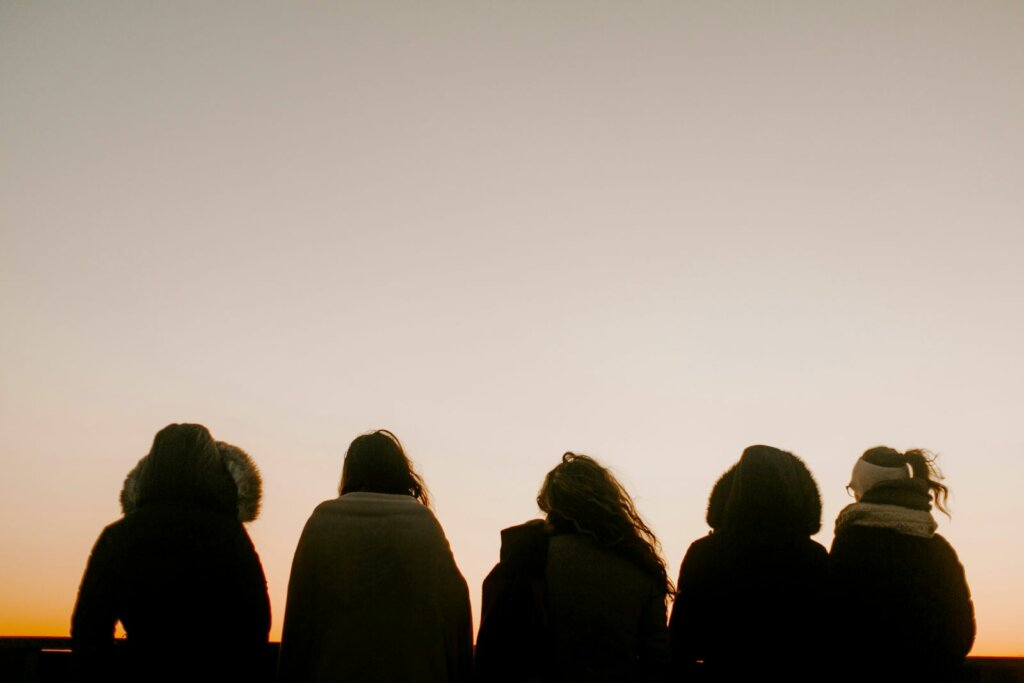
You belong somewhere, I promise. Photo by Annie Williams on Unsplash
Here’s the thing though – sure, in that setting every child said “country” but that doesn’t mean every child everywhere would have answered in the same way. I didn’t realize at that time I wasn’t weird, it’s more that I didn’t have anything in common with the people around me. That’s different. People who shared my interests existed in the world even if I didn’t go to school with them. What’s helping me to remember this is I organized a Zoom meetup for the young people in my spiritual community.
In our small group, we had people joining from London, Copenhagen, Moscow, and all over the U.S. Within the U.S., some people originally hailed from India, the Philippines, and Brazil. Only a handful of people live geographically close to me, which feels like the greatest gift, but also knowing there are people like me who live far away is a gift. It reminds me I do belong and there is a place for me. When I share that with the parts of me that feel like a weirdo, loser freak, they feel better too because I imagine a thread connecting me to each and every person in the world who is like me.
There’s a quote from C.S. Lewis who said, “Friendship is born at that moment when one person says to another: ‘What! You too? I thought I was the only one!’” Precisely. You’re not the only one even if sometimes it feels that way. You aren’t the only one even if the people around you are into different things. You already belong right here, right now and I hope you can feel that.
I dream of a world where we recognize someone, somewhere is into the things we’re into. A world where we remember that just because the people around us are into different things doesn’t mean we’re weird. A world where we recognize we may be far apart from the people who are most like us, but those people do exist. A world where we remember we already belong.
Another world is not only possible, it’s probable.
Lately, I’m on a genealogy kick trying to suss out who I’m related to and how. It’s endlessly fascinating because it’s a puzzle but also a web. As you know, there are many offshoots of a family tree — aunts, uncles, cousins — who all have their own direct family lines. But what’s even more interesting is that we’re all related, literally.
If you go back far enough, you reach a date when family trees share not just one ancestor in common but every ancestor in common, which is called the genetic isopoint. In other words, the family trees of any two people on the earth now, no matter how distantly related they seem, trace back to the same set of individuals. Geneticist Adam Rutherford told Scientific American, “If you were alive at the genetic isopoint, then you are the ancestor of either everyone alive today or no one alive today.” The genetic isopoint occurred somewhere between 5300 and 2200 B.C., according to statistical calculations.
“In relation to race, it absolutely, categorically demolishes the idea of lineage purity,” Rutherford added. That’s because no person has forebears from just one ethnic background or region of the world. Instead, we are all related. The poet Satyendra Dutta expresses this beautifully when he says, “There is only one race in the entire world, and the name of that race is the human race. We are bound together with the same breast milk of Mother Earth, and the same sun and moon are our common companions.”
Exactly! The same sun, moon, and stars are our common companions and we are all living on the same planet Earth. Yet somehow we forget that. We get caught up in dividing ourselves into this group or that. We say, “I’m not like you,” but is that really true? Don’t we all have the same feelings and needs? Aren’t we more alike than we are different? What do we get by focusing on differences, anyway?
My spiritual teacher said, “The opportunists tried in the past, are trying at present, and will try even in the future to fulfill their narrow desires by keeping the human race disunited. By severely reproaching this opportunistic craftiness through your noble deeds, you draw nigh the unknown strangers living far away and build a healthy world-based human family. Ignoring the brute forces, the sky-kissing arrogance, hypocrisy, immorality, and glib outbursts of the conceited people, go ahead towards your cherished goal.”
The cherished goal isn’t to become a billionaire, by the way. As you likely guessed, it’s to feel the sweet union between yourself and something greater than yourself. This is a quote from my spiritual teacher, after all.
Learning about genealogy reminds me we’re a universal family, quite literally. We are like a garden filled with numerous flowers, but ultimately all a part of the same garden. Like flowers, on the surface, we have different petals, different leaves. Some of us require more water and some of us require less, but we are all flowers. In other words, we’re all humans a part of the same race.
I dream of a world where we treat each other like family. A world where we extend care and appreciation to strangers because we recognize, they, too, are our siblings. A world where we understand there’s only one race, the human race. A world where we embrace the idea of a literal universal family.
Another world is not only possible, it’s probable.
I, like many, have a lot of feelings about the smattering of recent U.S. Supreme Court decisions. And then there are the bills targeting the LGBTQIA+ community. The trend I’m noticing is more divisiveness, more separation, and more hate, frankly. Is this what human beings are destined for? Are we doomed to splinter off into smaller and smaller groups and engage in constant “us versus them” culture wars?
Maybe yes, maybe no but according to neuroscience, our brains are wired for connection and cooperation. Neuroscientist Matthew D. Lieberman, director of UCLA’s Social Cognitive Neuroscience Lab wrote a book called Social: Why Our Brains are Wired to Connect. He says, “To the extent that we can characterize evolution as designing our modern brains, this is what our brains were wired for: reaching out to and interacting with others. These are design features, not flaws. These social adaptations are central to making us the most successful species on earth.”
There’s also a study out of Emory University led by Gregory Berns who learned that when pairs of volunteers cooperated with one another, the reward circuits of the brain were activated. These are the same regions that are activated by drugs. The activation happened only when paired with a human – when the study participants were paired with a computer, they didn’t have the same response.
Volunteers were hooked up to an fMRI scanner and invited to play the “Prisoner’s Dilemma” game. Each volunteer pressed a button to indicate when they were ready to play, and then each simultaneously pushed another button to indicate if they wished to cooperate with, or betray, the other player.
The most common outcome was volunteers mutually cooperated with one another. Berns suggests people are hard-wired to cooperate because the brain associates cooperation with reward. Others are quick to point out that correlation is not causation but I’m inclined to agree with Berns because regardless of whether it’s due to our brains or something else, we want to connect with other people. We are wired for oneness.
What so often gets in the way is exactly what we’re seeing now: socio-sentiment. Socio-sentiment means loyalty to a particular social group to the exclusion of other groups. You already know what a world dominated by socio-sentiment looks like – we’re living in it. What’s the solution?
My spiritual teacher says, “To liberate society from this unbearable situation, consciousness will have to be aroused among the people; their eyes will have to be opened by knowledge. Let them understand the what’s, the why’s, and the where’s. Thus, study is essential, very essential.”
In other words, biologically, we want to connect with others, we’re made for connection, and what’s getting in the way is cultural conditioning that says this group is good and this group is bad. We all do this. The challenge then is to see every person as a human being, not a label. Personally, I do this by practicing empathy and guessing what someone else is feeling and needing. And when I do, I feel even more connected. It’s almost as if my brain is wired for oneness and spurring me on.
I dream of a world where we promote unity instead of division. A world where we recognize we are all humans with the same feelings and needs. A world where we stop propagating socio-sentiment and instead recognize we’re all in the same group. A world where we remember we are wired for oneness.
Another world is not only possible, it’s probable.
Members of my community are at the age where they’re starting to die. It seems like every three months or so someone passes away. Some people I’m closer to than others, but regardless, each death leaves an impact.
Have you ever played that game where you stand in a circle and hold a piece of yarn while also throwing it to someone else in the circle? In the end, you wind up with a giant web that connects every person to everyone else. That’s what I think life is like. When someone dies, the metaphorical yarn is tugged and creates a ripple effect so everyone feels it, some more deeply than others. As for me, there are layers of grief. There’s the grief I feel from the person’s death, but there’s also the grief I feel for their family members, their friends, their colleagues. There’s up-close-and-personal grief and there’s also more removed grief.
In my spiritual community, we have a ceremony to honor the passing of people. It’s purely for the mourners, meaning we don’t believe the ceremony has any effect on the recently deceased person. One of the things we say in tandem is, “You have freed us today from all the social responsibility we bore toward our dearest so-and-so.” At one point we all pour water into our palms from the same pot and take a sip from our cupped hands. It’s the bookend to a baby naming ceremony.
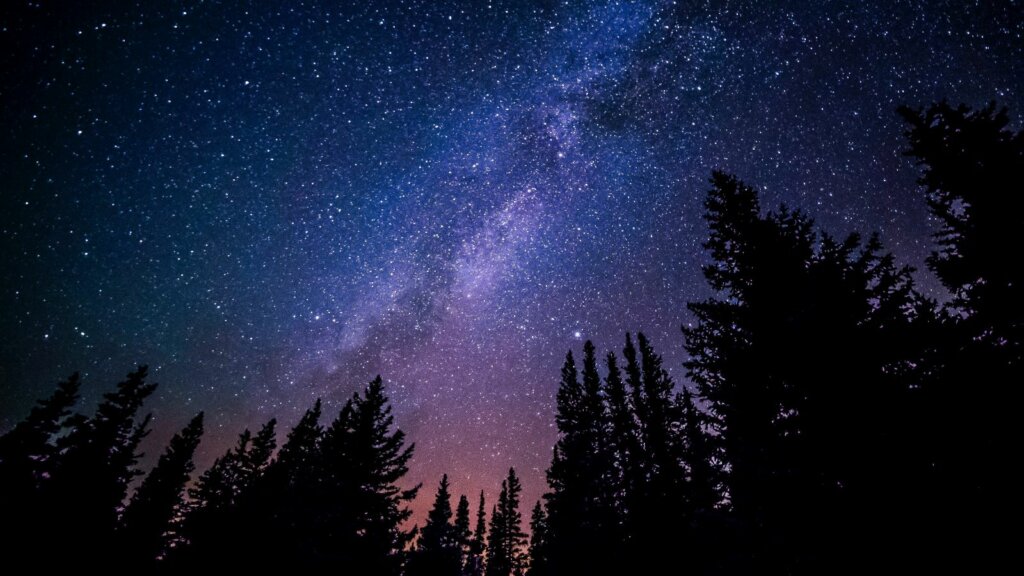
This picture will make sense later in the post. Photo by Ryan Hutton on Unsplash
With the baby naming ceremony, we are pledging responsibility to the baby symbolically by adding water into a tub, and with the mourning ceremony, we are taking it away. While the responsibilities are gone, the impact is not. Facebook is showing me pictures from a conference I used to go to in Vienna, Austria, every year. A few of those photos include Eric, a coworker who died years ago. It’s been many years since his passing, and we weren’t close, but every time I see his photo, my heart hurts a little, remembering he’s no longer with us.
I don’t have anything profound to say other than every person who is gone is not forgotten. We carry them with us in our hearts and they’re with us in another form. I’ll close here with an edited excerpt from writer and performer Aaron Freeman who in 2005 explained on NPR why you want a physicist to speak at your funeral:
“You want a physicist to speak at your funeral because they’ll explain to your grieving family about the conservation of energy, so they will understand that your energy has not died. You want the physicist to remind them about the first law of thermodynamics; that no energy gets created in the universe, and none is destroyed. All your energy, every vibration, every BTU of heat, every wave of every particle that was you remains in this world. The physicist will tell your mourners that all the photons that ever bounced off your face, all the particles whose paths were interrupted by your smile, by the touch of your hair, hundreds of trillions of particles, have raced off like children, their ways forever changed by you.
The physicist will them the warmth that flowed through you in life is still here, still part of all that we are, even as we who mourn continue the heat of our own lives. The physicist will explain to those who loved you that they need not have faith; indeed, they should not have faith. The physicist will let them know that they can measure, that scientists have measured precisely, the conservation of energy and found it accurate, verifiable, and consistent across space and time. Your energy’s still around. According to the law of the conservation of energy, not a bit of you is gone; you’re just less orderly.”
I dream of a world where we remember every person’s death creates a ripple on the spider web of life. A world where we understand a person may be gone, but they aren’t forgotten. A world where we remember when a person dies, their energy is still around us, and not a bit of the person is gone, they’re just less orderly.
Another world is not only possible, it’s probable.
I learned something fascinating recently: The idea male and female wolves compete to become dominant within packs is inaccurate. This competition only occurs in zoos and not in the wild. In 1944, Rudolph Shenkel, a biologist, first observed this behavior of vying for dominance in wolves at a German zoo but in the subsequent years, David Mech studied wolves in the artic and found wolf packs are families. In other words, the “alpha male” is the dad and the “alpha female” is the mom. The rest of the pack follows their lead because they’re the offspring, not because they fought a battle and lost.
While I find this little tidbit interesting, what intrigues me more is why the idea of the alpha male and female continues to percolate in our society. I think it’s because we want to use nature as an excuse for why we do the things we do and in a patriarchal, capitalistic society, an alpha is paramount.
In a patriarchal society, men and so-called masculine traits are at the top of the hierarchy. Under patriarchy, we value strength, power, and force. The strongest, most powerful are lauded and anyone or anything considered weak and feeble is disparaged. Men are at the top of the ladder and women are at the bottom, but it’s a continuum so while men who are perceived as more feminine are looked down upon, they are still above women in the power structure.
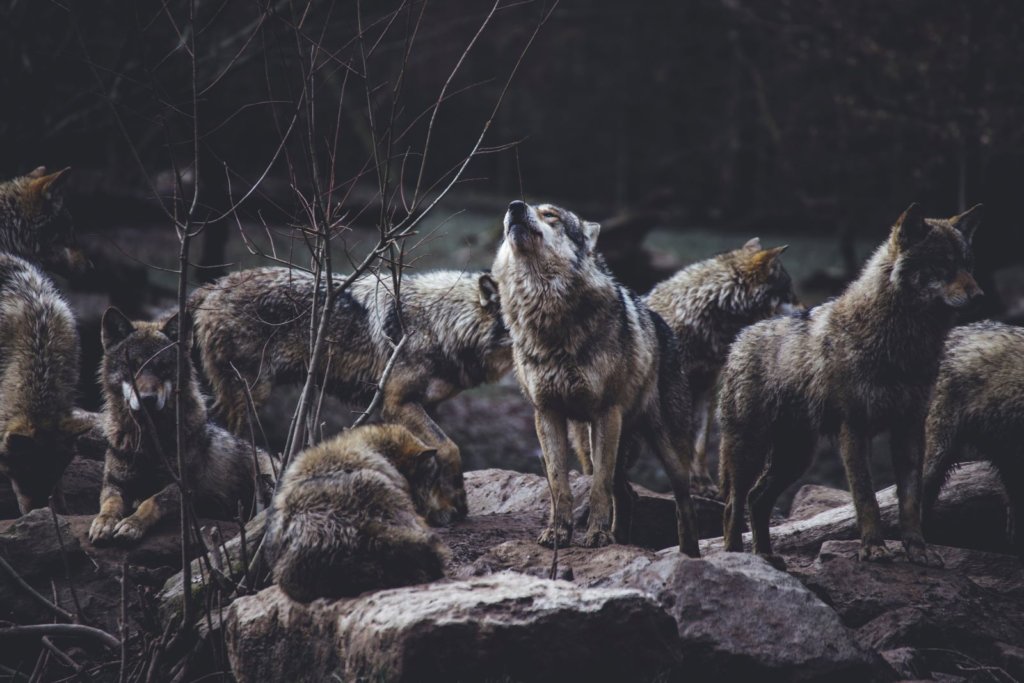
No alphas. Only parents. Photo by Thomas Bonometti on Unsplash
Through that lens, of course the idea of an alpha male is appealing because an alpha male is the epitome of what we praise under patriarchy. Capitalism feeds into the idea of the alpha because under capitalism, there’s the idea only one person can be in charge. Capitalism operates under a scarcity model – if there’s more for you, there’s less for me. That applies to not only money but power, resources, you name it.
We try to point to nature to say, “See? What we’re doing is only natural,” but over and over again, nature shows us collaboration is the name of the game. For instance, neighboring trees help each other through their root systems either directly, by intertwining their roots, or indirectly, by growing fungal networks around the roots that serve as a sort of extended nervous system. German forester Peter Wohlleben said, “If every tree were looking out only for itself, then quite a few of them would never reach old age.”
Also, bonobo females make lasting friendships and don’t tolerate aggressive males; the friendliest bonobos are always the ones with the most offspring. Ants and bees work together to make colonies and hives. I could keep going because examples of collaboration are endless. Instead of saying what we humans are doing is natural, it’s time to recognize we’re the anomaly. If we want to thrive as a species, we must cooperate with one another.
To quote my spiritual teacher, “Only the cooperative system can ensure the healthy, integrated progress of humanity, and establish complete and everlasting unity among the human race. People should work to enjoy sweeter fruits by establishing the cooperative system.”
Let’s enjoy those sweet fruits and start by retiring the mode of living like an alpha. Instead, let’s continue to take our cues from wolves and live like a universal family.
I dream of a world where we recognize the idea of an alpha male and an alpha female has outlived its usefulness. A world where we understand nature shows us over and over again that to survive and thrive we’re better off cooperating with one another. A world where we continue cooperating because we care about the progress of ourselves and the rest of humanity.
Another world is not only possible, it’s probable.
As we’re finishing the Jewish High Holidays, I think it’s only fitting to share a concept I learned about recently. In Jewish mysticism, there’s an idea that in every generation 36 people hold up the world. These lamed-vavniks do not themselves know they are one of the 36 and no one else does either. What intrigues me about this concept is it makes each and every person important. Basically, you think of yourself as playing a part in keeping the world spinning and because you don’t know who else is a “righteous one,” you treat others the same.
I like this concept because it also flies in the face of our current reality. These days, there’s a perspective that if you’re not a celebrity, athlete, politician, or influencer, that you’re not worth paying attention to. In fact, a Bloomberg study found 98% of middle school and high school students would like to be a social media influencer. Some of them already are. Gone are the days of “doctor” and “lawyer” topping the career list for kids. Now they want followers. I understand, I want followers too, but the concept of lamed-vavniks says you can be powerful and important and nobody would know about it.
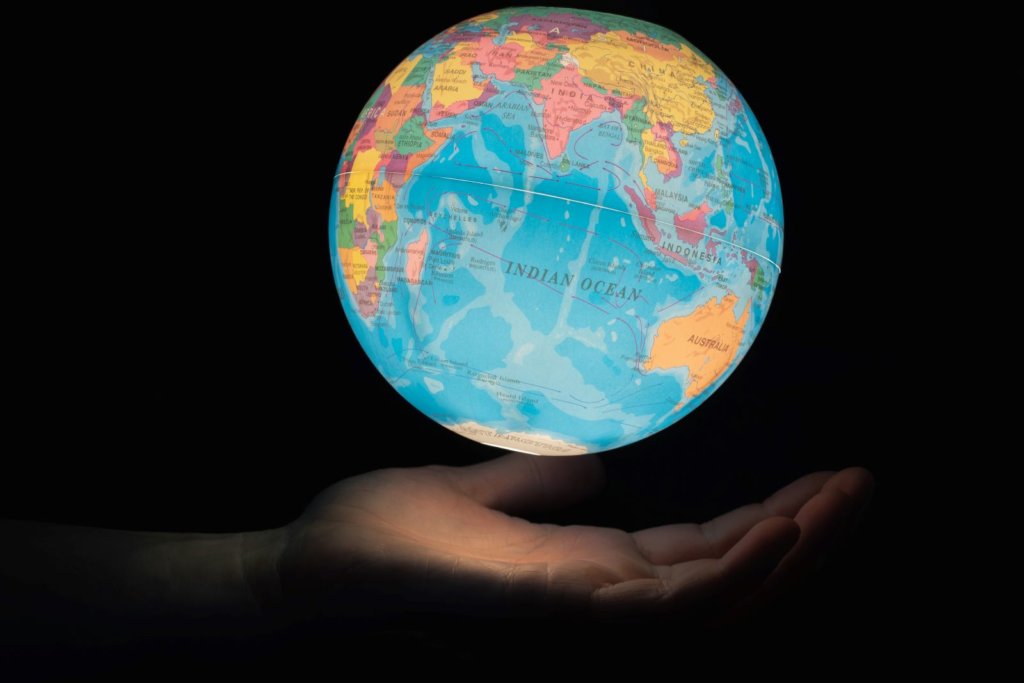
We hold up the world, metaphorically of course. Photo by Greg Rosenke on Unsplash
In other words, even without being an influencer, maybe you already have influence. Elizabeth Gilbert tells a story about how years ago she was on the midtown cross-town bus in New York. It was in January with sleeting wind and rain during evening rush hour traffic. The bus moved at a crawl and people were not in good moods. When the bus reached 10th Ave, the driver made an announcement.
He said, “Ladies and gentlemen, we are now nearing the Hudson River. I’m going to ask you to do me a favor. When you get off the bus, I’m going to hold out my hand. As you walk past me, I want you to drop your troubles into the palm of my hand. I’ll take your troubles for you, and when I drive past the river, I’ll throw them in. The reason I want to do this is because you all seem like you’ve had a bad day, and I don’t want you taking all your worries and sorrows home to your friends and families now. Because they deserve better than that, don’t they? So you just leave your troubles here with me to dispose of, and you all go have a wonderful night, OK?”
The entire bus erupted into laughter and sure enough, one by one the passengers exited the bus and dropped their troubles into the palm of the bus driver’s hand. They stepped off the bus with smiles on their faces.
We don’t know that bus driver’s name or anything about him, but we do know he made a difference that day. We know he directly influenced the people around him without sending a Tweet. It has me wondering, are you more important than you think you are? Are you someone who is holding up the world in your own way? You can’t know for sure so why not behave as if you are?
I dream of a world where we all understand the power we have to influence others and make a difference, even if we don’t have a million followers on Instagram. A world where we recognize sometimes the most ordinary-seeming person is capable of something extraordinary. A world where we behave as if each of us is holding up the world.
Another world is not only possible, it’s probable.
Facebook keeps showing me pictures from trips I took to Europe years ago, including one from Denmark in 2016. What I remember about that trip, other than laughing and exploring the country with a dear friend, is how everything reminded me of something else.
For instance, gazing out a train window, I could have sworn I was in Iowa, not Denmark, because the land was so similar. At the beach, the combination of the sand’s color, dunes, and water reminded me of the Outer Banks in North Carolina. I know there are places in Denmark that are completely unique, but all in all, whenever I travel, I’m reminded everything is more the same than it is different. Yes, the landscape, but also the people.
I may not speak the same language as someone else, but we both care about our friends and family. We both want to be happy, to feel secure in where we live. We all have the same needs, and in times like these, all times really, it’s important to keep focusing on what binds us.
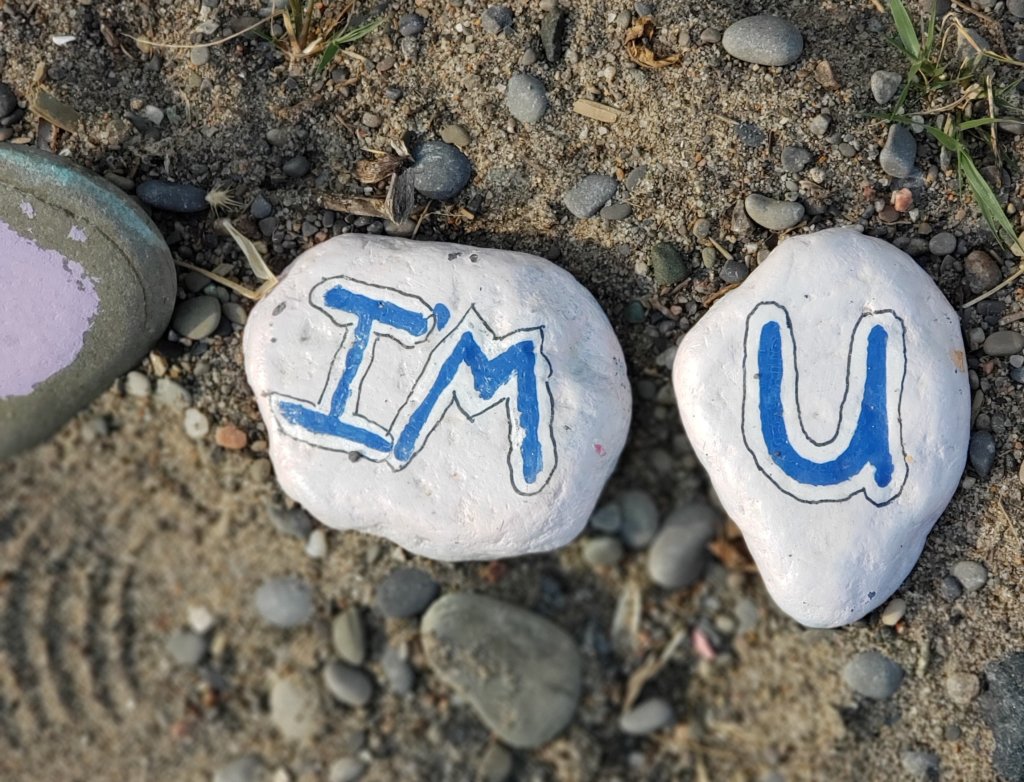
These rocks say it all. Photo by Phyllis Poon on Unsplash
In our world, there are some people who are trying to create division. There are some people who use one group or another as a scapegoat for the world’s problems. They speak in broad strokes like, “All of these people are like this,” or “Those people are like that,” which is dangerous. When we enhance separateness, that creates conflict because at the root of mistreatment is an “us” and “them” mindset. It’s easier to justify atrocious acts when a person becomes someone who is “not like me.” Or even worse, not human.
My spiritual teacher corroborates this and says “us” and “them” thinking makes different groups become more violent toward each other. We’ve seen this over and over again. Frankly, haven’t we had enough? I’m not so naïve to think there will never be any conflicts in the world, but I think we start moving in a better direction when we realize, to paraphrase Shakespeare, that we all bleed when we are pricked, that we all feel pain and sorrow, that we all want to be happy and to realize our dreams. We want the same things even if how we go about achieving them is different.
I’ve used this quote before but it continues to be relevant. My spiritual teacher adds, “Human society is just like a garland which is made of different types of flowers, woven together by one common thread. The overall beauty of the garland is dependent upon the beauty of each flower. Likewise, each strata of society must be equally strengthened if we are to maintain the unity and solidarity of society.”
We must all be lifted up. We must support one another. We must see each other as people who are just like us if we have any hope of maintaining unity and solidarity. Peace comes from a place of connection and that starts with recognizing we are more similar than different.
I dream of a world where we recognize what unites us rather than divides us. A world where we focus on our similarities, not our differences. A world where we remember people are people everywhere. A world where we work together to create as much peace as we can.
Another world is not only possible, it’s probable.
As we celebrate Dr. Martin Luther King Jr.’s birthday here in the U.S., I keep thinking about one of my favorite quotes of his. There are many because the man was an eloquent speaker, but in 1963 he said, “Injustice anywhere is a threat to justice everywhere. We are caught in an inescapable network of mutuality, tied in a single garment of destiny. Whatever affects one directly, affects all indirectly. Never again can we afford to live with the narrow, provincial ‘outside agitator’ idea. Anyone who lives inside the United States can never be considered an outsider anywhere within its bounds.”
It’s an interesting concept, and one that continues to be relevant, this notion of “outsider” and how we apply justice to anyone we perceive to be an outsider. Did you know it’s been 20 years since the first detainees arrived at Guantánamo Bay? And that those prisoners were subjected to torture? Only 39 prisoners remain and more than a dozen of them have yet to face charges. They have been dubbed “forever prisoners” by some Democrats. The cost of operating the prison is about $13 million per prisoner every year, according to a Business Insider article! Are you freaking kidding me? I could think of a lot of better uses for $13 million per person.
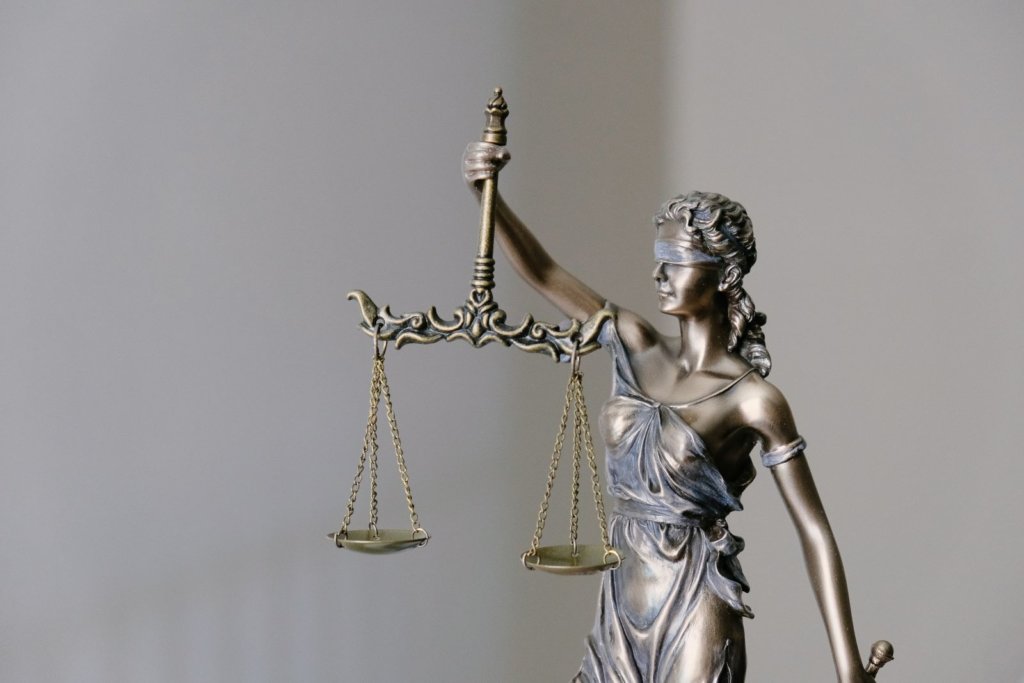
Justice is supposed to be blind, but is it? Photo by Tingey Injury Law Firm on Unsplash
And even if you’re saying, “Yeah but they’re terrorists! They need to be held captive!” The cost to house a single prisoner in California is more than $75,000, according to the LA Times, which is still more than a year at Harvard. Clearly there’s a lot of injustice, a lot of mismanaging funds, and yet a small group of people continue to let incidents like these occur.
It brings to mind an excellent article I read on LitHub by Rebecca Solnit posted in 2018 about how there’s a myth surrounding the “real” America. She wrote:
“[I]n the news and political life, we’re still struggling over whose story it is, who matters, and who our compassion and interest should be directed at.
“The common denominator of so many of the strange and troubling cultural narratives coming our way is a set of assumptions about who matters, whose story it is, who deserves the pity and the treats and the presumptions of innocence, the kid gloves and the red carpet, and ultimately the kingdom, the power, and the glory. You already know who. It’s White people in general and White men in particular, and especially White Protestant men, some of whom are apparently dismayed to find out that there is going to be, as your mom might have put it, sharing. The history of this country has been written as their story, and the news sometimes still tells it this way – one of the battles of our time is about who the story is about, who matters and who decides.”
Precisely. So much of justice and injustice is tied to who matters and who decides. If Black people don’t matter, then it’s fine to kill them in the streets. If terrorists don’t matter, it’s OK to torture them. But who exactly is deciding they don’t matter? And why is that those people are in charge? The reality is the White population in the U.S. is declining and other races are increasing. Where I live, the majority of people are not White. To my mind, that means decisions being made about policies and procedures should take into account that diversity, should recognize this country belongs to everyone who lives here. In essence, to bear in mind what Dr. King mentioned so long ago: that injustice anywhere is a threat to justice everywhere.
I dream of a world where we treat all human beings with love and respect. A world where we value justice not only in word but in action. A world where we celebrate and protect human diversity while also seeking to transcend divisions. A world where we honor Dr. King’s legacy by bringing his dream into reality.
Another world is not only possible, it’s probable.
